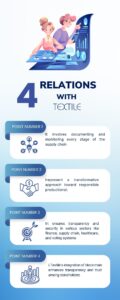How Blockchain is related to Textile
Introduction: The textile industry operates within a complex web of interconnected processes, from raw material sourcing to the delivery of finished products to consumers. Amidst this intricate network, concepts like supply chain traceability, anti-counterfeiting measures, smart contracts, data sharing through blockchain, and sustainability with ethical sourcing have emerged as critical pillars reshaping the industry landscape. These transformative elements stand as testaments to the industry’s commitment to transparency, authenticity, efficiency, and responsible practices. They not only safeguard against counterfeit products but also foster consumer trust, encourage sustainable methodologies, and drive the industry toward a more accountable and socially conscious future. Let me descrive How Blockchain is related to Textile.

Here are some key points How Blockchain is related to Textile
Supply Chain Traceability: Supply chain traceability in the textile industry refers to the ability to track and trace raw materials, production processes, and distribution of textile products throughout their lifecycle. It involves documenting and monitoring every stage of the supply chain, from sourcing raw materials like cotton or polyester to manufacturing, transportation, and retail.
Traceability ensures transparency and accountability by recording key information such as origins of raw materials, suppliers involved, manufacturing locations, and certifications obtained (like organic or fair trade). Technologies like RFID tags, barcodes, blockchain, and software systems facilitate the collection and sharing of this data across the supply chain and digital marketing.
In the textile industry, traceability serves various purposes. It helps in verifying sustainability claims, ensuring compliance with regulations and standards, preventing counterfeit products, and addressing ethical concerns like forced labor or unsafe working conditions. Consumers increasingly demand transparency about the products they purchase, and traceability enables brands to provide detailed information about the product’s journey from its inception to the store shelf.
Ultimately, supply chain traceability in textiles fosters trust between consumers and brands, encourages sustainable practices, and supports ethical sourcing, benefiting both the industry and the planet and this is How Blockchain is related to Textile.
Anti-counterfeiting: Anti-counterfeiting measures in the textile industry are critical to combat the proliferation of counterfeit products and protect brand integrity. Various strategies are employed to authenticate textiles and prevent fraudulent replication. Advanced technologies play a pivotal role, integrating unique identifiers and tracking systems.
One approach involves the use of RFID (Radio Frequency Identification) tags or NFC (Near Field Communication) chips embedded in textiles. These tags contain encrypted information that can be scanned for verification, allowing manufacturers, retailers, and consumers to authenticate the product’s origin and characteristics.
Moreover, advancements in nanotechnology have enabled the integration of microscopic markers or “taggants” into textile fibers. These markers possess distinct characteristics, invisible to the naked eye, and can only be detected through specialized equipment. Such covert markers serve as an additional layer of security against counterfeiting.
Additionally, QR codes, holograms, and secure labels featuring unique patterns or designs are employed to provide visual verification of authenticity.
Collaboration among industry stakeholders, stringent regulatory frameworks, and consumer education are essential in combating counterfeit textiles. By implementing a multifaceted approach encompassing technological innovation, stringent quality control, and educational initiatives, the textile industry endeavors to safeguard against counterfeiting and maintain consumer trust in genuine products and How Blockchain is related to Textile blog will make you energize.
Smart Contacts: Smart contracts integrated into blockchain technology bring transformative changes to the textile industry by enhancing transparency, traceability, and efficiency throughout the supply chain. Leveraging blockchain’s decentralized ledger system, these contracts automate and validate agreements between involved parties, ensuring secure and immutable transactions.
In textile manufacturing, smart contracts embedded within a blockchain network enable seamless monitoring of every stage, from raw material sourcing to the final product. They facilitate transparent tracking of fabric origins, production processes, quality assessments, and distribution channels. This transparency helps in verifying the authenticity of products, ensuring compliance with ethical standards, and reducing the risk of counterfeit items and we can agree with this title How Blockchain is related to Textile.
Moreover, these contracts enable automated execution of payments and transactions, triggered by predefined conditions being met. This feature streamlines financial settlements between suppliers, manufacturers, and distributors, eliminating delays and reducing administrative overhead.
By combining smart contracts with blockchain technology in textiles, the industry experiences heightened trust among stakeholders through verified and unchangeable records. It also promotes sustainability by enabling consumers to make informed choices based on the traceability of products, ultimately fostering a more accountable, efficient, and reliable textile ecosystem.

Data Sharing and Collaboration: In the textile industry, blockchain technology revolutionizes data sharing and collaboration by offering a secure, transparent, and efficient framework for various stakeholders involved in the supply chain. Blockchain ensures the integrity of data by creating an immutable ledger that records every transaction or interaction across the textile production process.
Through blockchain, textile manufacturers, suppliers, designers, retailers, and consumers can securely share and access information in real-time. Smart contracts embedded in the blockchain automate and enforce agreements, facilitating seamless collaboration and trust among participants. For instance, smart contracts can trigger actions like payment release upon the fulfillment of certain conditions, ensuring timely transactions and reducing disputes for this reason it agrees on How Blockchain is related to Textile.
Moreover, blockchain enhances traceability by providing an unalterable record of each product’s journey from raw material sourcing to the final product. This transparency fosters accountability and enables consumers to verify the authenticity, ethical sourcing, and sustainability claims of textile products.
By leveraging blockchain’s decentralized nature, sensitive data like designs, intellectual property, and compliance certifications can be securely shared among authorized parties, mitigating the risk of data breaches and unauthorized access.
Overall, blockchain technology transforms the textile industry by optimizing processes, enhancing transparency, fostering trust among stakeholders, and promoting sustainable and ethical practices through secure data sharing and collaboration. This why How Blockchain is related to Textile.
Sustainability and Ethical Sourcing: Sustainability and ethical sourcing within the textile industry, supported by blockchain technology, represent a transformative approach toward responsible production and supply chain transparency. Sustainability encompasses practices aiming to minimize environmental impact, reduce waste, and conserve resources throughout the textile lifecycle. This involves utilizing eco-friendly materials, implementing efficient manufacturing processes, and promoting circularity by recycling and upcycling.
Ethical sourcing goes beyond environmental concerns, focusing on fair labor practices, worker welfare, and social responsibility. It ensures humane working conditions, fair wages, and ethical treatment of employees across the supply chain. Blockchain technology plays a pivotal role by providing an immutable and transparent ledger system that traces every stage of textile production, from raw material sourcing to manufacturing and distribution. It enables real-time monitoring of transactions and product origins, enhancing accountability and authenticity. We need to study about How Blockchain is related to Textile.
By integrating blockchain, stakeholders can verify the authenticity of sustainable claims, track product origins, and ensure adherence to ethical standards. Consumers gain access to reliable information, empowering them to make informed choices aligned with their values. Let me show How Blockchain is related to Textile. This synergy between sustainability, ethical sourcing, and blockchain technology fosters trust, encourages responsible practices, and drives the textile industry towards a more transparent, accountable, and socially conscious future.How Blockchain is related to Textile.

Immutable Data Storage: The article delves into the concept of immutable data storage through blockchain technology. It emphasizes blockchain’s capability to create tamper-proof records by chaining data blocks together using cryptographic hashes. Immutable storage refers to the inability to alter or delete data once it’s added to the chain, ensuring data integrity and trustworthiness and this is How Blockchain is related to Textile.
Blockchain’s decentralized nature distributes copies of the ledger across multiple nodes, making it challenging for any single entity to manipulate the stored information. Each block contains a unique hash, linking it to the previous block, creating a chain of blocks. Any attempt to modify a block would alter its hash, thereby disrupting the chain and alerting the network to the tampering attempt. We have to make it easy about How Blockchain is related to Textile.
Immutable data storage on the blockchain has multifaceted applications. It ensures transparency and security in various sectors like finance, supply chain, healthcare, and voting systems. Smart contracts, executable code stored on the blockchain, automate processes further, enhancing transparency and trust among involved parties.
However, challenges such as scalability, energy consumption, and regulatory frameworks still pose hurdles to widespread blockchain adoption for immutable data storage. Despite these challenges, the article emphasizes blockchain’s potential to revolutionize data storage by providing a secure, transparent, and unchangeable ledger system.

Data integrity and consensus: Textile, a cutting-edge technology in the textile industry, has embraced blockchain as a powerful tool for enhancing consensus mechanisms within its network. By leveraging blockchain, Textile achieves a decentralized consensus among multiple network participants without relying on a central authority. This innovation revolutionizes the integrity and reliability of stored data and transactions.How Blockchain is related to Textile.
Blockchain’s decentralized ledger system allows Textile to create a tamper-resistant record of information. Each block in the chain contains a unique cryptographic hash, linking it securely to the previous block. This immutable structure ensures that once data is recorded, it cannot be altered without consensus from the network’s majority.How Blockchain is related to Textile.
Textile’s integration of blockchain enhances transparency and trust among stakeholders. Smart contracts, executable code stored on the blockchain, facilitate automated and self-executing agreements, streamlining processes while reducing the risk of fraud or manipulation. This not only optimizes supply chain management but also bolsters authentication and provenance tracking within the textile industry . If we make this happen in Textile industry then there will no questions How Blockchain is related to Textile.
Through the use of blockchain for consensus mechanisms, Textile fortifies data integrity, fosters collaboration, and establishes a reliable framework for the secure exchange of information and transactions across its decentralized network and for these reasons agree on How Blockchain is related to Textile.
Conclusion: The textile industry is experiencing a profound transformation fueled by innovations such as supply chain traceability, anti-counterfeiting measures, smart contracts integrated with blockchain, data sharing, and a focus on sustainability through ethical sourcing. These advancements have redefined how stakeholders interact within the industry, emphasizing transparency, authenticity, and responsibility. Through traceability, authentication, and ethical practices bolstered by technological integration, the industry is poised to provide consumers with greater confidence in the products they purchase, while also steering towards more sustainable and socially responsible production methods. As the industry continues to embrace these changes, collaboration, technological advancements, and a shared commitment to ethical practices will undoubtedly shape a future where textiles are not only products of quality but also symbols of conscientious and accountable manufacturing. How Blockchain is related to Textile. You can chcek another interesting blog in here.
- What is blockchain?
- What is ethical sourcing?
- What is supplychain?